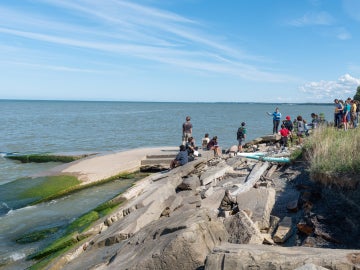A Conversation with Baron Pineda
October 17, 2018
Communications Staff

Associate Professor of Anthropology and Latin American Studies Baron Pineda
Photo credit: Jennifer Manna
A cultural anthropologist specializing in human rights and indigenous peoples, Associate Professor of Anthropology and Latin American Studies Baron Pineda is one of seven scholars advising Facebook on the challenges of enforcing community standards.
How did you become involved in Facebook’s Data Transparency Advisory Group and Yale Law School’s Justice Collaboratory?
Recently, Facebook has been exploring ways to seek feedback and advice from academics around a variety of new challenges that they are confronting on the platform. Earlier this year, I was invited to meetings at Facebook offices around the country to discuss the possibility of creating one such group that would be dedicated to having a look at the work that Facebook is doing on enforcing what they call their “community standards.” These standards are basically the rules of conduct that Facebook would like to be upheld on the platform. Tracey Meares and Tom Tyler, directors of the Justice Collaboratory at Yale Law School, are coordinating our work. They are experts in institutional reform of the criminal justice system in the United States and abroad, so their expertise is particularly valuable for Facebook as they think about how to best manage the platform.
What is the purpose and expectation of this group?
In May of this year, Facebook released a report called the “Community Standards Enforcement Report” which represented their first major effort to publicly release quantitative data on some of the violations that occur on Facebook. In this report, they give a quantitative picture of their efforts to address “violating content” by, for example, using computer systems and people to detect it and remove it quickly. This first report was focused on the following six areas: graphic violence, adult nudity and sexual activity, terrorist propaganda, hate speech, spam, and fake accounts. The main charge of our group of academics is to assess this report and provide feedback and suggestions to Facebook. I have learned a great deal about the challenges that Facebook and other social media companies are dealing with as they manage a platform with more than 2 billion users, and I have met a lot of wonderful people who spend their days trying to figure out how to deal with these challenges.
What is your role in the effort?
I am the only anthropologist in the group of seven academics that constitute the Data Transparency Advisory Group (DTAG). My colleagues are either legal scholars or experts in the relationship between metrics (the gathering of accurate and reliable data) and institutional monitoring and reform. My role is to bring to bear the strengths of anthropology (a cross-cultural perspective and an attention to the complexities of cultural dynamics) on the tough questions that we are hearing about from Facebook. It is exactly these strengths that I try to teach to my students in my classes at Oberlin.
What is your current research focus?
I currently am writing a book about global indigenous politics, human rights and the United Nations called Indigenous Conventions: Human Rights and Cultural Politics at the United Nations. I have brought many groups of students to the UN as academic observers over the years and I am planning another such trip this year. The work that I have been doing at Facebook is quite different than my UN work, but the issues that come up are really fascinating and complex and relate to issues of free speech, censorship, pluralism, surveillance, and propaganda. I am thinking of ways to move forward after this experience with DTAG into a research project of my own that picks up on some of these themes. I currently am working with a student research assistant, Stephen Gruppuso ’20, on developing ways for us to study social media anthropologically.
What are some developments in the field of anthropology that most people don’t know about?
Even though Laura Nader, an eminent legal anthropologist at UC Berkeley, made her famous call for anthropologists to “study up” in the early 1970s, I don’t think many people are aware of all of the ways that our traditional anthropological tools are brought to bear on the study of powerful people and institutions. In my work at the UN, I have had a number of people come up to me and tell me that they always know when an anthropologist is speaking because of their unique perspective. In the section of Introduction to Cultural Anthropology that I teach every semester, I always tell students that my main goal is to teach them how to think like an anthropologist. I like to imagine that even if they don’t major in anthropology or work directly as an anthropologist, they will be enriched by an anthropological perspective and that distinctive perspective will be evident to people with whom they work in the future.
You may also like…
Oberlin Launches Critical AI Studies Minor in Fall 2026
With a solid foundation in both science and the humanities, this minor ensures students to understand and be able to analyze the ethical, cultural, environmental, political, economic, technological, and labor effects of AI.
Research Roundup
Every day, Oberlin’s faculty and students produce scholarly work that uncovers new insights into how we understand the world, particularly in the areas of sustainability and the environment.
Longman Professor Emeritus of English and Creative Writing David Young Dies at 88
Longman Professor Emeritus of English and Creative Writing David Young died on Saturday, May 3. He was 88. An esteemed poet, translator, editor, and scholar, Young taught at Oberlin between 1961 and...


